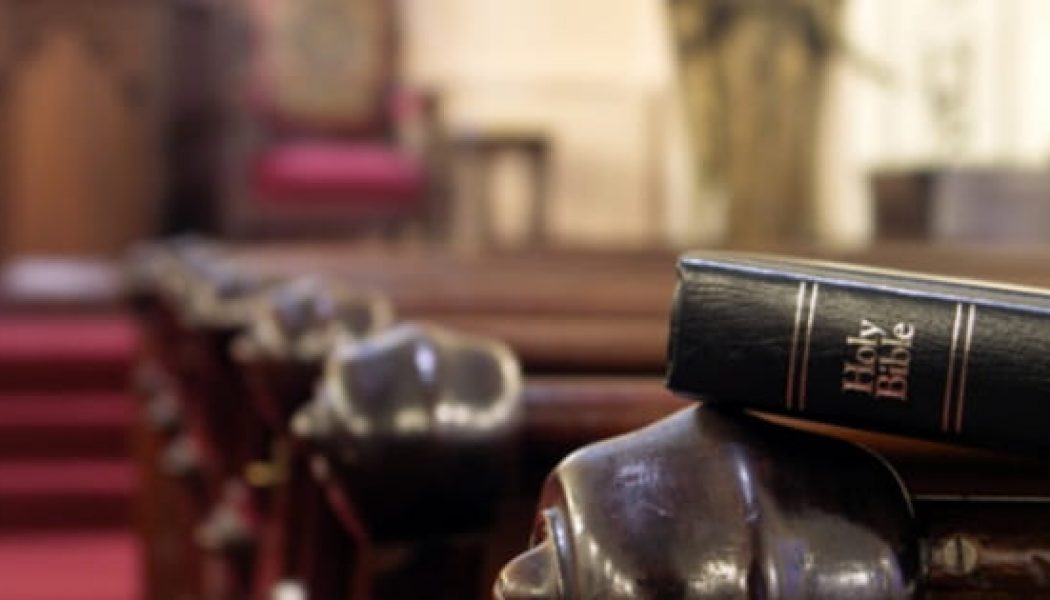prosperity
Expect More from Preaching
What expectations do you bring to hearing God’s Word preached? The preaching of the gospel is a powerful means of grace for the Christian, but is that your expectation? What is the nature of your expectations every time you hear the word of god preached? A gospel-centered church will have a congregation full of Christians with gospel-centered expectations every time the Word of God is proclaimed. Their commentary (and lifestyle) post-preaching will show the nature of their expectations, whether they are God-honoring or not. OFF-BASE EXPECTATIONS When it comes to the preaching of God’s Word (or gospel) . . . » If you expect to come away with intellectual insights, you will find something to satisfy knowledge cravings. » If you expect the preacher will say something deb...
“Go and Wait” Precedes “Go and Tell”
Jesus’ commission isn’t just “go and tell.” First, it’s “go and wait.” In line with Luke’s emphasis on the person and role of the Holy Spirit, it’s no surprise that the command of Christ in Luke 24 is not to go into the world to make disciples, but rather to go to Jerusalem and wait for the coming of the Spirit. The fact that Jesus’ command before His ascension is “go and wait” rather than “go and tell” underscores the importance of the Holy Spirit’s role in enabling the disciples to live up to the identity Jesus has given them. What happens if we miss this point? We will overestimate the work Christians can do in their own power. We downplay the necessity of the Spirit in the work of taking the Gospel to the nations. The Obligation Last week, I wrote a blog post pointi...
What Is the Sinner’s Prayer?
In Christian circles, the “Sinner’s Prayer” typically refers to a non-Christian’s initial prayer of repentance and faith in the death, burial, and resurrection of Jesus; thus, it is often associated with the moment of conversion into the Christian faith. In some cases, however, it has created some confusion and misunderstanding regarding the nature of saving faith and one’s assurance of salvation. Confessing With Your Mouth The message of the Gospel is the message of Jesus, God in flesh, who lived a perfect life, died on a cross as a payment for sins, and was physically raised from the dead. Now, Christ “commands all people everywhere to repent” (Act 17:30) and place their faith and trust in his work alone for the forgiveness of sins. The Bible says that saving faith is a repentant f...
Jesus’ Last Words from the Cross
Every year on Good Friday, Christians take time to meditate on the depth of Jesus’ sacrifice for us in suffering a humiliating, bloody death by crucifixion. It’s a time to dwell on what Jesus suffered for us, in all its pain and intensity, without rushing straight ahead to the good news of Easter, resurrection, and new life. The Last Words of Jesus One of the ways Christians have traditionally meditated on Good Friday is by reading and reflecting on the seven last words of Jesus from the cross. Luke records the final words of Jesus before he died on the cross: It was now about the sixth hour, and there was darkness over the whole land until the ninth hour, while the sun’s light failed. And the curtain of the temple was torn in two. Then Jesus, calling out with a loud voice, said, “Father, ...
Why Did Jesus Curse a Fig Tree?
“How did the fig tree wither so quickly?” (Matthew 21:20). Fig trees are for making figs. Pretty simple, really. We plant apple trees because we want apples, peach trees because we want peaches, orange trees because we want oranges, and fig trees because we want figs. We might as well ask what good is an apple tree that doesn’t produce apples? You might as well cut it down. Or curse it, as Jesus did the fig tree (Matthew 21:18-19). How did Jesus know the fig tree was barren? Because the leaves and the fruit typically appear at about the same time. To see a fig tree covered with leaves but with no fruit meant that it was barren. Three insights will help us understand this story. First, in the Old Testament the fig tree often stood as a symbol for the nation of Israel ...
Who Is Really to Blame for His Death?
People have for centuries argued about who was to blame for killing Jesus. Sadly, some have even used the issue to justify anti-Semitism, blaming the entire Jewish race for the death of jesus christ. But ultimately Jesus was not a victim of either Rome or the Jewish leaders. The apostle Peter says in Acts 2:23 that Jesus was “delivered up by the predetermined plan and foreknowledge of God.” The Jewish leaders and the Roman official who carried out His crucifixion undeniably bear guilt for the sin of what they did, but God Himself had foreordained how and when Jesus would die. Yes, the Jewish leaders of that day who condemned Him were culpable. They plotted, concocted false charges against Him, and blackmailed the Roman governor Pontius Pilate into carrying out their will. They ...
Jesus Is “The Firstborn from the Dead?”
At the beginning of the book of Revelation, John writes this greeting to the churches he’s addressing: Grace to you and peace from him who is and who was and who is to come, and from the seven spirits who are before his throne, and from Jesus Christ the faithful witness, the firstborn of the dead, and the ruler of kings on earth. (Revelation 1:4) The title “firstborn of the dead” for Jesus is of great theological importance, especially with Easter in the background. The Greek word for “firstborn” that John uses is prōtotokos, a word that literally refers to birth order—the first child born. This is a concept of great significance in the Old Testament, where the firstborn son inherited his father’s place as head of the family, receiving the father’s blessing and a double portion&n...
Why the Arguments for Gay Marriage Are Persuasive
With two landmark gay marriage cases before the Supreme Court we are already seeing a flurry of articles, posts, tweets, and status updates about the triumph it will be when America finally embraces equality for all and allows homosexuals to love each other. These tweets and posts and articles perfectly capture the reason why the arguments for gay marriage have become so persuasive so fast. Given the assumptions and patterns of thinking our culture has embraced in the last fifty years, the case for gay marriage is relatively easy to make and the case against it makes increasingly little sense. I don’t think the arguments or gay marriage are biblically faithfully, logically persuasive, or good for human flourishing in the long run, but they are almost impossible to overcome with most Americ...
Is Easter Too Violent for Children?
Every year, around this time, parents and churches ponder how to communicate the Easter story to children, as something more than dyed eggs. The problem is, of course, that it’s impossible to talk about the resurrection of Jesus without talking about death. And, in the case of Jesus, it’s really hard to talk about death without talking about crucifixion. Some churches resolve this tension by deeming the cross too violent for kids. They talk instead about Easter meaning that Jesus is our “forever friend.” They say that Jesus “went away for a little while, and his friends were sad,” but that he soon “came back to see them.” Most Christian churches, thankfully, still speak on Easter of the cross and the resurrection, but in many places this is, ...
Easter Sunday Is Over, Now What?
Perhaps you are asking that this week as you return to your day-to-day responsibilities. If there’s one thing that the past few days’ focus on Christ’s cross did, it’s remind most of us how unfocused we’ve been on the death and resurrection of Christ. We look back with grief over the way we yet again allowed the blood of Christ to slip to the periphery of our lives and let many other lesser things in to replace it. Why did we let it happen again? More importantly, how can I stop it happening again? Here are eight directions to help you live a cross-centered life: 1. Have Easter every week As far as we know, the New Testament church did not celebrate Easter once a year. They celebrated it every week; on the first day of the week to be exact. Every Sunday, they gathered to commemorate Christ...
More Blessed to Give Than to Receive?
For several years of blogging I had it all wrong, and I wasn’t wrong only in blogging, but in all of life. I believed that the way to measure success with this blog was to keep an eye on statistics, to measure growth in readership over a period of weeks or months or years, and to do the things that were necessary to stimulate that kind of growth. Where I saw growth in the number of readers I believed I had succeeded and where I saw a drop in the number of readers I believed that I had failed. But somewhere along the way I came to understand and to reflect on a much bigger and wider principle that applies not only to blogging but to all of life. It is the principle that it is more blessed to give than to receive (see Acts 20:35). This is hardly an obscure passage or a verse that Christ...
Should Only Baptized Christians Take Communion?
In a recent worship service in our church, I invited all “baptized believers” to join us at the Lord’s Table. That prompted a question from several people: why say, “baptized believers?” Is baptism really a prerequisite for taking communion? Of course, not all churches would answer this in the same way. But the majority of Christians throughout history have believed that only baptized people should participate in Eucharistic meal. I think it’s a biblical position, and here’s why. The Meaning of Baptism and the Lord’s Table (Communion) There are two sacraments given to the church, baptism and the Lord’s Table, but these serve different functions.[1] Meaning of Baptism Baptism is a one time event that signifies: identification with Christ, initiation into the Christian faith, and entra...





















